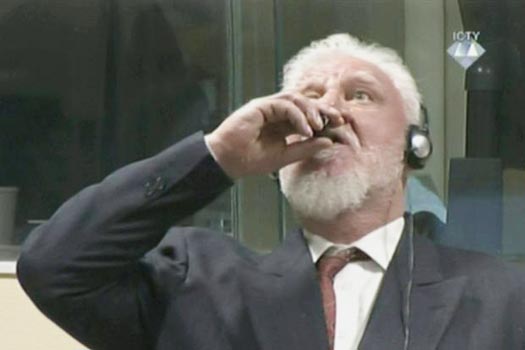
A United Nation’s Judge in the Hague was left stunned after former Bosnian Croat military commander, Slobodan Praljak drank a liquid believed to be poison from a small bottle seconds after he was handed a 20 year war crime sentence.
A flustered judge halted the hearing and the struggling Praljak was rushed to a nearby hospital where he reportedly died, casting a pall over the last case at the ground- breaking International Criminal Tribunal for the former Yugoslavia.
Shocking images of the 72 year old former philosophy professor and theatre director who became a war time general shouting “I am not a war criminal” and drinking what he said was poison were streamed live on the court’s website and around the Balkans.
Judges had upheld sentences ranging from 10 to 25 years against Praljak and five other Bosnian Croat wartime political and military leaders for their parts in plans linked to Croatia’s former President, Franjo Tudjman to violently carve out a Croat dominated mini state in Bosnia by killing, maltreating and deporting Muslims.
Croatian Prime Minister, Andrej Plankovic while offering his condolences to Praljak’s family said the former general’s action reflected the “deep moral injustice” done to him and the five others whose sentences were upheld by the appeal judges on Wednesday.
The judges had ruled that Praljak was guilty of crimes including murder, persecution and inhumane treatment as part of the plot to establish a Croat entity in Bosnia in the early 1990s.
Interestingly, Praljak, who had surrendered to the tribunal in April 2004 and had already served 13 years, could have walked free because those who are convicted are generally released after serving two – thirds of their sentences.
The courtroom where the dramatic tragic incident unfolded has been sealed off and tagged a crime scene.

Devastating 7.7 Magnitude Earthquake Rocks Southeast Asia, Killing Multiple People
Trump Announces Sweeping 25% Tariffs On Imported Cars And Parts
Sensitive US Military Plans Leaked In Stunning Security Breach
Israel Resumes Strikes On Gaza, Killing Over 400 Amid Ceasefire Breakdown